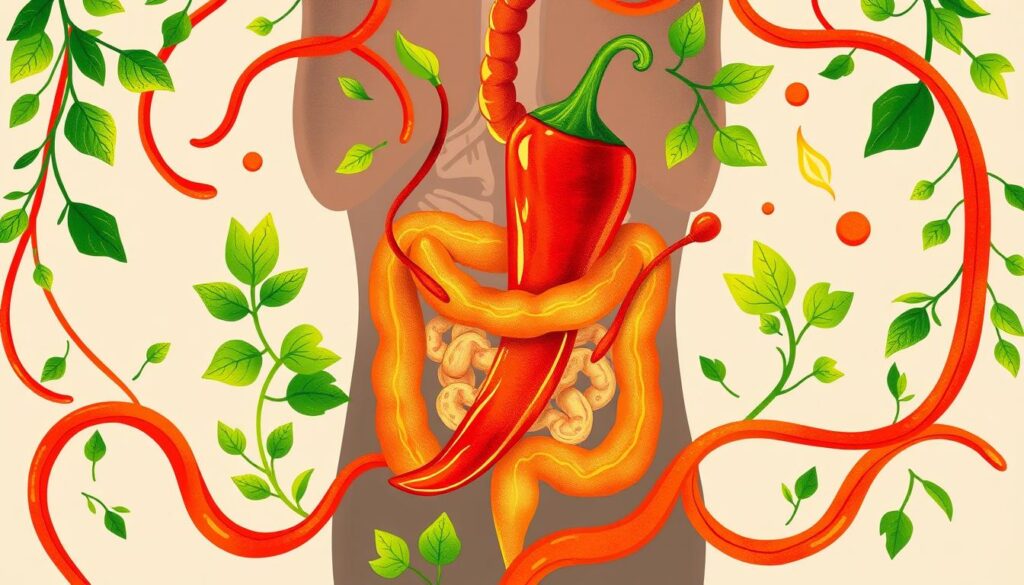Cayenne pepper is a bright red chili pepper. It’s very hot, with a Scoville Heat Unit of 30,000-50,000. This spice is famous for capsaicin, which helps with pain, boosts metabolism, and supports digestion and the immune system.
This spice is not just for flavor. It’s full of good stuff like antioxidants and vitamins. One cayenne pepper has a lot of vitamin C and vitamin A.
Key Takeaways
- Cayenne pepper contains capsaicin, which offers numerous health benefits
- It’s a rich source of antioxidants, vitamins, and minerals
- Cayenne pepper can help with pain management, digestion, and weight loss
- It supports cardiovascular health and boosts the immune system
- Incorporating cayenne pepper into your diet is a natural way to improve overall wellness
What is Cayenne Pepper and Its Origins
Cayenne pepper is known as Capsicum annuum. It belongs to the nightshade family. This family also includes bell peppers and jalapeños. Cayenne peppers started in Central and South America. Now, they grow all over the world, loving warm places.
The Nightshade Family Connection
Cayenne peppers are part of the Capsicum genus. This group is in the Solanaceae family, also known as nightshades. These plants are spicy and have been used for cooking and medicine for a long time.
Understanding the Scoville Scale Rating
The Scoville scale measures chili pepper heat. Cayenne peppers are pretty spicy, with 30,000 to 50,000 Scoville heat units (SHUs). This scale shows how spicy a pepper is by measuring capsaicin.
Historical Uses Across Cultures
Cayenne pepper has been used for ages in medicine and cooking. It’s popular in Cajun, Creole, Ayurvedic, and Eastern medicine. People like it for its spicy taste and health benefits.

“Cayenne pepper is a versatile spice that has been used for centuries in traditional medicine and culinary traditions around the world.”
The Benefits of Cayenne Pepper
Cayenne pepper is a versatile spice with many health benefits. It helps with pain and digestion. This spicy seasoning is a great natural remedy.
Capsaicin is a key part of cayenne pepper. It helps with pain, like arthritis and migraines. Putting cayenne pepper on the skin can also help with pain.
Cayenne pepper also helps with digestion. It can prevent stomach ulcers and keep the gut healthy. Eating cayenne pepper might even lower heart disease and cancer risks.
- Cayenne pepper has vitamins A, C, and E. These vitamins are good for health.
- Eating cayenne pepper can help burn more calories. This can aid in weight loss.
- Some studies say cayenne pepper can lower blood sugar and improve sports performance.
But, eating too much cayenne pepper can upset your stomach. Always talk to a doctor before adding cayenne pepper to your diet.
“Cayenne pepper is a spicy seasoning that packs a powerful punch of health benefits, from pain relief to digestive support and beyond.”

Essential Nutrients and Antioxidants in Cayenne Pepper
Cayenne pepper is not just hot. It’s also full of good stuff. It has vitamins, minerals, and antioxidants. These help keep you healthy.
Vitamins and Minerals Profile
Cayenne pepper is full of vitamins A, C, and E. It also has B-complex vitamins like B6 and niacin. Plus, it has manganese, iron, magnesium, and potassium.
Powerful Antioxidant Properties
Cayenne pepper is great because of its antioxidants. It has capsaicin, carotenoids, and flavonoids. These fight off bad stuff in your body.
Nutritional Value Per Serving
A half-cup (30g) of fresh cayenne pepper has:
- Calories: 30
- Protein: 1.5g
- Carbohydrates: 6.5g
- Fiber: 1g
- Vitamin A: 2080 mcg
- Vitamin C: 76.4 mg
- Vitamin E: 1.2 mg
- Manganese: 0.9 mg
- Iron: 0.8 mg
- Magnesium: 12 mg
- Potassium: 201 mg
Fresh cayenne peppers are the best. But dried cayenne is also good. Adding cayenne pepper to your meals is a smart choice.

How Capsaicin Works in Your Body
Capsaicin is what makes cayenne pepper hot. It’s a special molecule that helps your body in many ways. It works as a pain reliever by stopping pain signals.
It also helps your body burn more calories. This is because it makes your body warmer. So, cayenne pepper can help you lose weight.
Capsaicin makes your stomach work better too. It helps make more digestive fluids. This can make your digestion better and help your gut health.

The many benefits of capsaicin come from how it works with your body’s receptors. It turns on these receptors, causing many good things to happen.
Adding capsaicin from cayenne pepper to your diet can be good for you. It can help with pain, boost your metabolism, and improve your health. Always talk to a doctor before trying new supplements.
Pain Management and Anti-inflammatory Properties
If you’re looking for natural pain relief, try cayenne pepper. It has capsaicin, a strong pain reliever. Capsaicin blocks pain signals to the brain.
This is great for nerve pain. It helps with diabetic neuropathy, postherpetic neuralgia, and osteoarthritis.
Topical Applications for Pain Relief
The FDA says capsaicin creams work for nerve pain. Studies show they reduce inflammation and pain. They also help with psoriasis, fibromyalgia, and post-mastectomy pain.
Natural Treatment for Arthritis
Cayenne pepper is good for arthritis too. Its anti-inflammatory properties fight joint pain and swelling. Capsaicin creams and injections help with osteoarthritis and rheumatoid arthritis.
| Study | Findings |
|---|---|
| 1992 Randomized Trial | Topical capsaicin cream was effective in treating the postmastectomy pain syndrome. |
| 1991 Double-blind Trial | Topical capsaicin showed promise in managing the pain of osteoarthritis in the hands. |
| 1993 Double-blind Trial | Intranasal capsaicin was found to be effective in treating cluster headaches. |

“Capsaicin, the main bioactive ingredient in cayenne pepper, desensitizes nerve ends, stopping pain signals temporarily.”
Digestive Health and Gut Benefits
Spice up your digestive health with cayenne pepper! This fiery ingredient can change your gut for the better. Capsaicin in cayenne pepper makes your stomach work harder. It helps break down food better and supports cayenne pepper digestion.
Cayenne pepper may also stop common stomach ulcers. Capsaicin helps good bacteria grow in your gut. This is key for a strong digestive support system and a healthy immune system.
- Studies involving 29 participants found that cayenne pepper consumption can influence the human gut microbiota and reduce intestinal inflammation.
- Another study recruited 44 healthy, non-smoking participants between 19 and 55 years old to evaluate the effects of cayenne pepper on gut health.
- Participants were divided into two groups based on BMI and consumed tomato juice with 1.8 g of cayenne pepper daily for 5 days before crossing over to the other study arm.
- After data analysis, the final sample size for the study was 58 stool samples, providing valuable insights into the gut-enhancing properties of cayenne pepper.
Looking to help your digestive system and keep your gut healthy? Cayenne pepper is a great choice. Add it to your meals and see the benefits for yourself!

“Cayenne pepper has been used for thousands of years by various cultures to treat stomach ailments, manage pain, boost the immune system, and improve circulation problems.”
Weight Management and Metabolism Effects
Looking to boost your metabolism and manage weight? Cayenne pepper might help. It has capsaicin, which can burn more calories and reduce hunger.
Appetite Suppression Properties
Capsaicin in cayenne pepper makes you feel full longer. This can lead to eating fewer calories. A 2021 study showed it helps burn fat and control hunger.
Metabolism Boosting Capabilities
Capsaicin in cayenne pepper also boosts metabolism. A 2017 review said it activates brown fat for calorie burning. A 2018 study found it reduced body fat in 12 weeks.
Remember, cayenne pepper isn’t a magic weight loss pill. It’s good with a healthy diet and exercise. Always talk to a doctor before adding it to your routine.

While cayenne pepper isn’t proven for direct weight loss, it’s worth trying. Adding it to your diet in small amounts can help with weight management.
Cardiovascular Health and Blood Circulation
Cayenne pepper is more than just a spicy flavor. It might help your heart and blood flow too. Research is showing it could be good for your heart and blood.
Capsaicin is in cayenne pepper. It might help your blood vessels stay healthy. This could lower your blood pressure. Capsaicin makes blood vessels wider, helping blood flow better.
Eating chili peppers, like cayenne, might lower death risk. This is true for heart attacks and strokes. Cayenne’s anti-inflammatory effects could help prevent heart disease.
Cayenne pepper can make food taste better. This might help you eat less salt. Less salt is good for your blood pressure.
Cayenne pepper could be great for your heart. It helps blood flow and might lower blood pressure. But, talk to a doctor before eating a lot of cayenne.

Immune System Support and Disease Prevention
Cayenne pepper adds a spicy kick to food. It also helps your immune system and may prevent some diseases. The red peppers have strong antioxidants.
Antioxidant Defense System
Cayenne peppers have capsaicin, vitamin C, and vitamin A. These help protect your cells. They fight aging and may prevent heart disease and some cancers.
A fresh cayenne pepper has lots of vitamin C and vitamin A. Even powdered cayenne has a lot of vitamin A.
Anti-Cancer Properties
Capsaicin in cayenne pepper might fight cancer. It could slow cancer growth in prostate, skin, and pancreatic cancers.
People who eat chili peppers like cayenne live 13% longer. Cayenne is full of antioxidants, more than other peppers.

“Spicy foods containing capsaicin like cayenne peppers can aid in appetite suppression and possible weight loss, though not enough to make up for a bad diet.”
Eating cayenne pepper can boost your immune system. It might lower disease risk. But, use it in small amounts for a healthy life.
How to Include Cayenne Pepper in Your Diet
Cayenne pepper is made from dry red chili flakes. It can add flavor and spice to your meals. You can use it in cayenne pepper recipes and spicy seasoning to make your food more interesting.
Adding cayenne pepper to soups, stews, or scrambled eggs is easy. You can also add it to homemade hummus, chili, or hot chocolate. For something different, chop fresh cayenne peppers and sauté them with veggies or mix them into cornbread.
- Add cayenne pepper to soups, stews, and eggs for a spicy flavor boost.
- Mix it into homemade hummus, chili, or hot chocolate for a unique twist.
- Chop fresh cayenne peppers and sauté them with vegetables or mix them into cornbread batter.
When buying fresh cayenne peppers, choose bright, shiny, and firm ones. Store them in a paper bag in the fridge. Only wash them when you’re ready to use them. Start with a little cayenne pepper and add more as you get used to the heat.
“Cayenne pepper can be a flavorful and versatile addition to your culinary repertoire, whether you’re looking to spice up your meals or reap the health benefits of this vibrant spice.”
Adding cayenne pepper to your diet can be tasty and good for you. Just start slow and listen to your body. Find the right amount that feels good for you.
Potential Side Effects and Precautions
Cayenne pepper is usually safe if you eat it in small amounts. But, too much can upset your stomach or cause heartburn. It might also irritate your mouth and throat.
If you have stomach problems like ulcers or irritable bowel syndrome, be careful. Don’t eat too much cayenne pepper.
Drug Interactions
Cayenne pepper can affect some medicines. This includes blood thinners, aspirin, and stomach acid reducers. ACE inhibitors are also affected.
If you take these medicines, talk to your doctor first. They can tell you if it’s safe to use cayenne pepper.
Recommended Dosage
There’s no set amount of cayenne pepper to eat. It depends on each person. But, use it as a spice in your food or take supplements as directed.
When you handle fresh cayenne peppers, wear gloves. This helps avoid skin irritation.
Even though cayenne pepper is good for you, listen to your body. If you have bad reactions, see a doctor. Eating it in small amounts is best.
“Cayenne pepper is generally safe when consumed in moderation, but it’s important to be aware of possible side effects and interactions.”
Conclusion
Cayenne pepper is amazing and good for you. It helps with pain and inflammation. It also helps with weight and heart health.
This spice has capsaicin, which boosts your metabolism. It also has vitamins and minerals for your health.
But, be careful with cayenne pepper. It’s safe in small amounts. If you have health issues or take medicines, talk to a doctor first.
With the right amount, cayenne pepper can help your body. It can ease pain and make your metabolism better. Add it to your food for flavor and health benefits.


